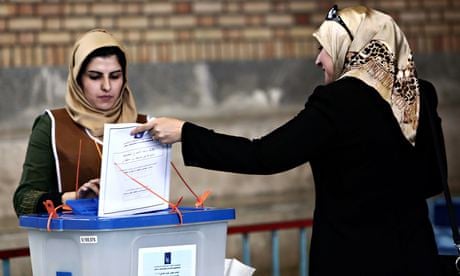Iraqi army helicopters have hit what they believe was a jihadist convoy in eastern Syria, killing at least eight people, in a show of strength days before the country's first national elections since 2010.
It was the first airstrike inside Syria claimed by Iraq since the three-year uprising against President Bashar al-Assad erupted in March 2011. The conflict has spilled across the border, contributing to a rise of violence in Iraq since the country's 2006-08 sectarian war.
Meanwhile, Iraqis living overseas began voting before Wednesday's general election in which the prime minister, Nuri al-Maliki, is seeking a third term despite worsening sectarian tensions at home, rampant corruption and high unemployment.
"The army struck eight tanker trucks in Wadi Suwab inside Syrian territory as they were trying to enter Iraqi territory to provide the Islamic State in Iraq and the Levant [Isis] with fuel," Iraq's interior ministry spokesman, Brigadier General Saad Maan, said.
Sunni radical Isis emerged in Iraq in the wake of the US-led invasion in 2003, and expanded into Syria during the uprising against Assad.
Maan said there was no co-ordination with the Syrian regime before the strike. "Our responsibility now is to protect our border and to protect the border from the other side, because there is no protection from the other side," he said.
The targeted vehicles were apparently travelling to the western Iraqi border province of Anbar, where Isis has been battling Iraqi security forces.
Isis fighters and other militants control the city of Fallujah in Anbar, just a short drive from Baghdad, and security officials are worried the group is seeking to encroach on the capital as well.
Illustrating those concerns, Isis was behind the bombing of a Shia political rally on Friday that killed 36 people.
The latest show of force by Iraqi security forces came as voting opened for Iraqis living in 29 countries overseas, including substantial contingents in Britain, Sweden, Jordan, Iran and Germany.
"I want to see my country rise and assume its leading position," said Lina Moushtaq after she voted in Dubai.
Out-of-country voting will continue on Monday, when prisons, hospitals and Iraq's security forces will cast their ballots before Wednesday's national poll.
Maliki, who has been lambasted by critics for allegedly consolidating power and targeting minority groups, is bidding for a third term; with the opposition fractious and divided, he remains the frontrunner, analysts and diplomats say.
Maliki blames foreign interference for the deteriorating security situation and complains he has been saddled with a unity government of groups that snipe at him in public and block his legislative efforts.
No single party is likely to win an absolute majority , however, and as in previous elections, coalition talks are likely to take months.
The month-long campaign has seen Baghdad and other cities plastered with posters and decked out in bunting, as candidates have taken to the streets, staged loud rallies and challenged each other in angry debates. Attacks on candidates, election workers and political rallies have cast a shadow over the election, and parts of the country that have been out of government control for months will not see any ballots cast.
One reason for cheer, however, has been the rising oil output that has swelled government coffers. But even enthusiasm for that has been tempered because the increased exports have made little impact on employment and voters complain much of the revenue is lost to graft.









